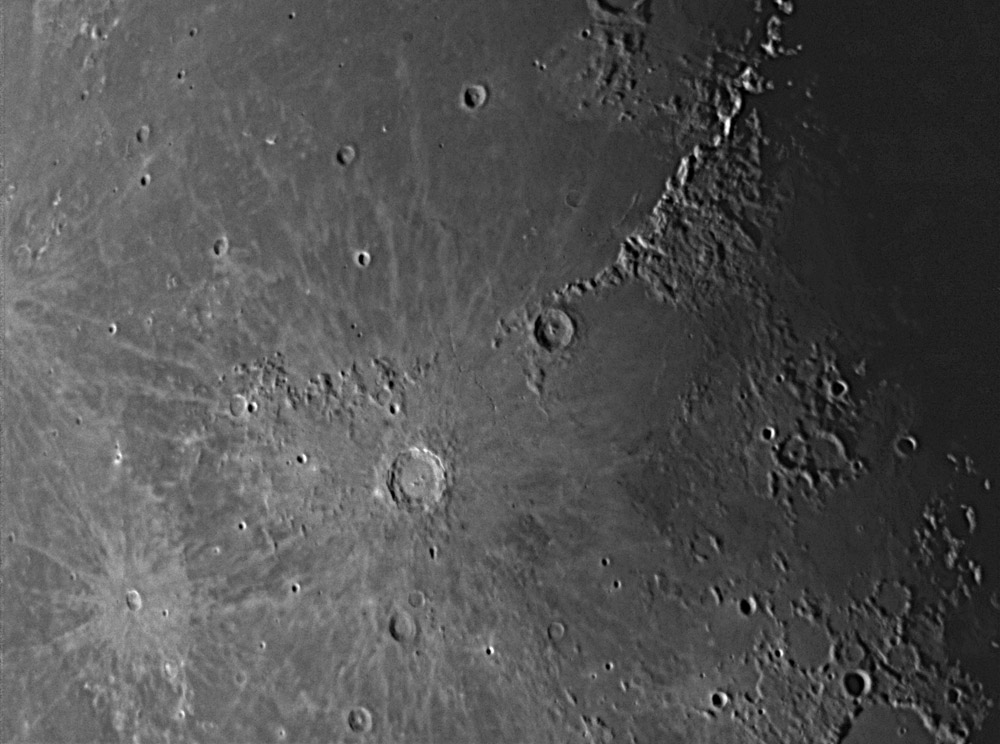Difference between revisions of "July 21, 2014"
| (One intermediate revision by the same user not shown) | |||
| Line 6: | Line 6: | ||
<em>image by [mailto:russellbateman@hotmail.com Russell Bateman], Leitches Creek, Nova Scotia, Canada</em><br /> | <em>image by [mailto:russellbateman@hotmail.com Russell Bateman], Leitches Creek, Nova Scotia, Canada</em><br /> | ||
<br /> | <br /> | ||
| − | I like this image for two reasons. First, it was taken by a new contributor to LPOD, which is always a happy occurrence. And secondly, the image was acquired with inexpensive, entry-level equipment. When I was first interested in the Moon, images this good could only rarely be taken by amateurs, and really good photographs only came from large telescopes like the Lick 36", McDonald 82", and once the Lick 120". But as we have seen with previous [http://lpod. | + | I like this image for two reasons. First, it was taken by a new contributor to LPOD, which is always a happy occurrence. And secondly, the image was acquired with inexpensive, entry-level equipment. When I was first interested in the Moon, images this good could only rarely be taken by amateurs, and really good photographs only came from large telescopes like the Lick 36", McDonald 82", and once the Lick 120". But as we have seen with previous [http://www2.lpod.org/wiki/July_13,_2011 iPhone] images and ones from other inexpensive telescopes, good results like this allow personal discoveries, annotation of nomenclature, and feeling of pride that leads to noticeable improvements. I especially encourage personal discovery - looking closely at Copernicus, for example, to recognize its elevated rim, flat floor, not quite central peaks, and strong rays. Once this basic structure of medium to large craters is understood, then differences can be noticed with smaller or older craters, leading to speculations about the processes that form and modify craters. So I welcome Russell to LPOD, and hope that he will continue his lunar studies, while reading some of the previous 3,000 plus LPODs and the books illustrated at bottom right.<br /> |
<br /> | <br /> | ||
<em>[mailto:tychocrater@yahoo.com Chuck Wood]</em><br /> | <em>[mailto:tychocrater@yahoo.com Chuck Wood]</em><br /> | ||
| − | Comment: I just noticed this text is a little derivative! See this [http://lpod. | + | Comment: I just noticed this text is a little derivative! See this [http://www2.lpod.org/wiki/April_19,_2014 LPOD]. Maybe I've run out of fresh things to say...<br /> |
<br /> | <br /> | ||
<strong>Technical Details</strong><br /> | <strong>Technical Details</strong><br /> | ||
| Line 15: | Line 15: | ||
<br /> | <br /> | ||
<strong>Related Links</strong><br /> | <strong>Related Links</strong><br /> | ||
| − | <em>[ | + | <em>[[21st Century Atlas of the Moon|21st Century Atlas]]</em> charts 17 & 18.<br /> |
Russell's [https://twitter.com/RussellBateman1 Twitter page] and [https://plus.google.com/+RussellBateman/posts Google +] page with 2 million views!<br /> | Russell's [https://twitter.com/RussellBateman1 Twitter page] and [https://plus.google.com/+RussellBateman/posts Google +] page with 2 million views!<br /> | ||
<br /> | <br /> | ||
<p><b>Yesterday's LPOD:</b> [[July 20, 2014|One of the Billions of Memories]] </p> | <p><b>Yesterday's LPOD:</b> [[July 20, 2014|One of the Billions of Memories]] </p> | ||
| − | <p><b>Tomorrow's LPOD:</b> [[July 22, 2014|Meteoroids Hitting Earth | + | <p><b>Tomorrow's LPOD:</b> [[July 22, 2014|Meteoroids Hitting Earth and Moon]] </p> |
<hr /> | <hr /> | ||
{{wiki/ArticleFooter}} | {{wiki/ArticleFooter}} | ||
Latest revision as of 07:29, 28 October 2018
A New One

image by Russell Bateman, Leitches Creek, Nova Scotia, Canada
I like this image for two reasons. First, it was taken by a new contributor to LPOD, which is always a happy occurrence. And secondly, the image was acquired with inexpensive, entry-level equipment. When I was first interested in the Moon, images this good could only rarely be taken by amateurs, and really good photographs only came from large telescopes like the Lick 36", McDonald 82", and once the Lick 120". But as we have seen with previous iPhone images and ones from other inexpensive telescopes, good results like this allow personal discoveries, annotation of nomenclature, and feeling of pride that leads to noticeable improvements. I especially encourage personal discovery - looking closely at Copernicus, for example, to recognize its elevated rim, flat floor, not quite central peaks, and strong rays. Once this basic structure of medium to large craters is understood, then differences can be noticed with smaller or older craters, leading to speculations about the processes that form and modify craters. So I welcome Russell to LPOD, and hope that he will continue his lunar studies, while reading some of the previous 3,000 plus LPODs and the books illustrated at bottom right.
Chuck Wood
Comment: I just noticed this text is a little derivative! See this LPOD. Maybe I've run out of fresh things to say...
Technical Details
July 19, 2014. Nexstar 5 SE and Neximage 5 camera @3.1mp with post processing in GiMP 2.8
Related Links
21st Century Atlas charts 17 & 18.
Russell's Twitter page and Google + page with 2 million views!
Yesterday's LPOD: One of the Billions of Memories
Tomorrow's LPOD: Meteoroids Hitting Earth and Moon
COMMENTS?
Register, Log in, and join in the comments.



